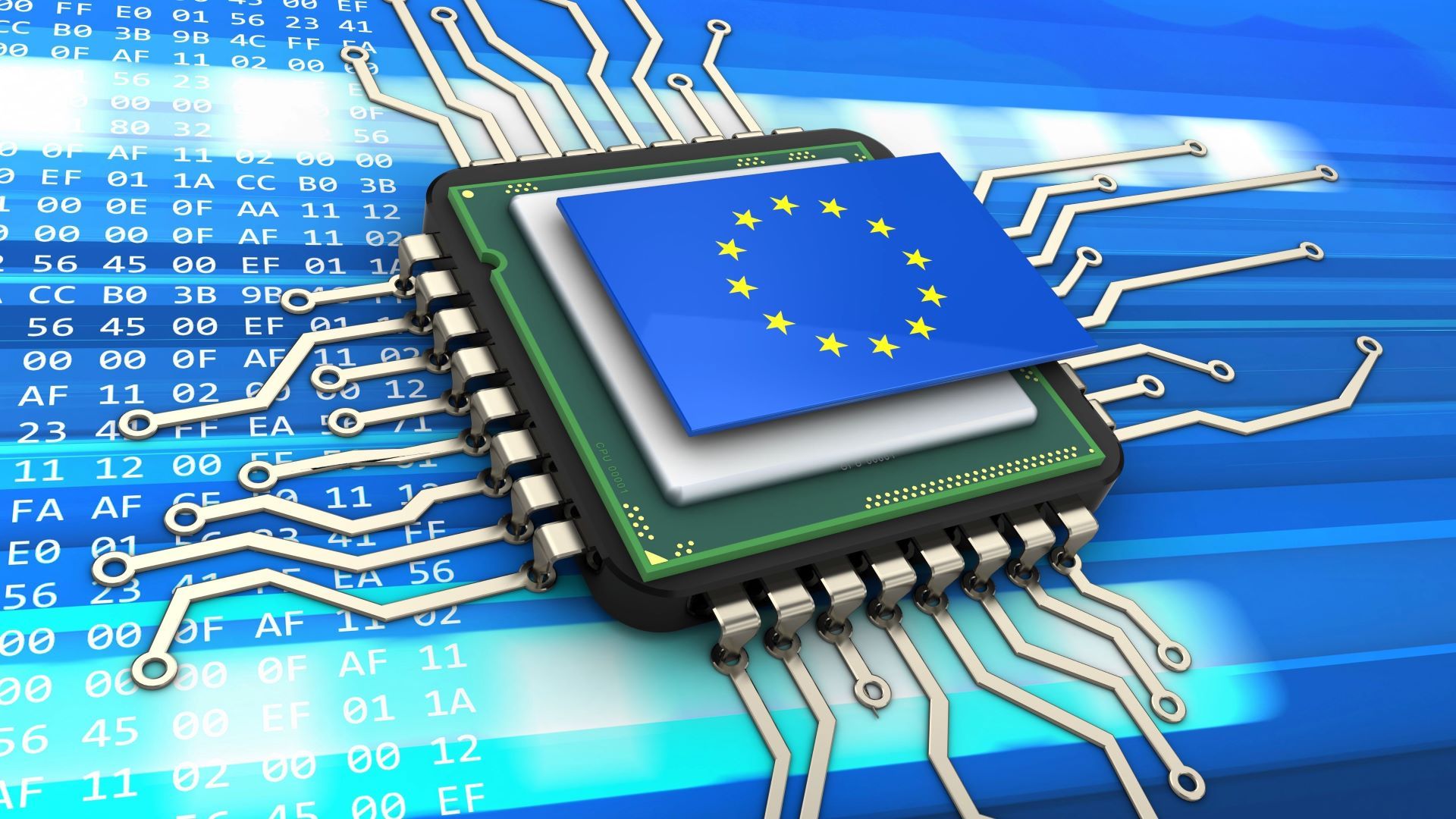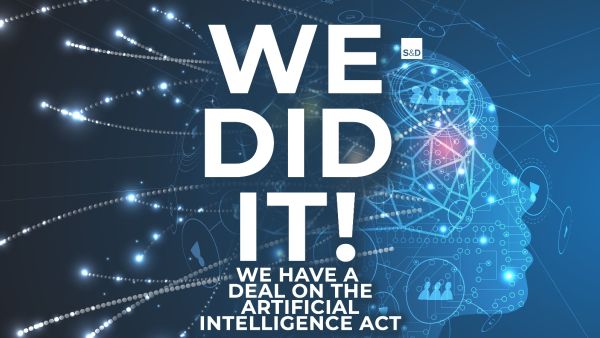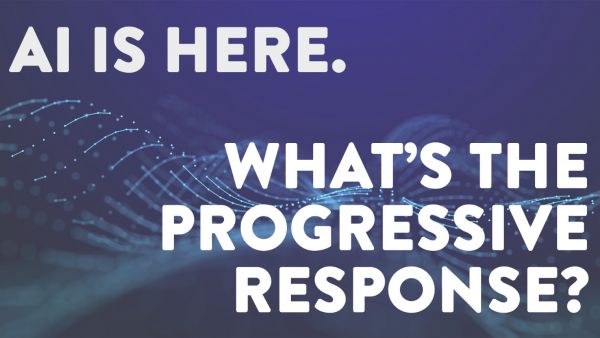As Europe continues to navigate the digital transition, the S&D Group has identified several key areas that require close attention and action. These areas include anything from protecting employees working for platforms such as Uber, to taxing large tech companies such as Google and Facebook.
In the following sections, we will examine each of these points, outlining the challenges and opportunities they present, and the specific policy recommendations put forward by the S&D Group to address them.
Please see the complete position paper for a comprehensive look at the topics listed below and more.

We need to ensure that the digital revolution does not leave working people behind. New forms of employment, such as platform work, must prioritise a better work-life balance, closing the gender pay gap, and provide safe working environments. This can be achieved through improved working conditions, the establishment of minimum wages, and the promotion of strong collective bargaining, with the active involvement of social partners across the EU and the implementation of the European Social Security Number (ESSN).

Social dumping is a serious issue that has far-reaching consequences for workers and businesses alike. When companies exploit differences in social standards between countries to gain a competitive advantage, they create an uneven playing field that can result in a decline in labour standards and working conditions. This not only harms workers who are subjected to substandard conditions but also puts pressure on businesses that want to maintain high standards but find it difficult to compete with those that do not. It is essential that we take strong legal and regulatory measures to prevent social dumping and put an end to the "race to the bottom". By doing so, we can ensure that workers are treated fairly and that businesses can compete on a level playing field while still maintaining high standards of social responsibility.
We must be vigilant of Artificial Intelligence (AI). The European Union must take action to ensure that our values are upheld and that AI is used in a responsible and safe manner. We need clear and strong rules to guarantee fairness and transparency in AI development and use.
No one should have to sacrifice their fundamental rights for the sake of technological advancement. That's why we must demand that high-risk AI undergoes a thorough assessment for biases and discrimination, and if it poses a risk to our rights, it must be banned. Human oversight and transparency requirements should always be in place to ensure that AI is used ethically and responsibly. The use of AI in the workplace must be subject to strong regulations that protect workers' rights and dignity and can in no way lead to the exploitation or surveillance of worker’s performance. Any worker who has been harmed by the use of AI must have the right to seek redress and hold corporations accountable.
In short, we must put people before profits and ensure that technology is used in a way that benefits workers and society as a whole.
Access to a high-quality internet connection should be considered a fundamental right in today's digital age. The internet helps us stay connected and access important information. However, not everyone has equal access to the internet due to factors like where they live, their income, and their abilities. This creates a digital divide that we need to bridge.
Having access to digital public services is also crucial. Everyone should be able to use the internet to access government services, like paying taxes or applying for benefits - though no one should be forced to, especially where equal access is not yet guaranteed. When everyone has access to these services, we can create a fairer and more equal society.
But when we do have access to the internet, it doesn't mean we should be connected all the time. Employers need to respect our right to disconnect from work outside of established working hours. It's important for our mental and physical health to have a balance between work and personal life.

Promoting and investing in digital education and training is crucial, particularly as digitalisation accelerates, due to events such as the COVID-19 pandemic. A progressive Digital Literacy and Qualifications Agenda should be adopted in the context of the 2023 European Year of Skills, and citizens should have free access to digital education to improve digital literacy and reskill. It is also essential that new learning formats respect children's developmental needs, while digital education curricula promote active citizenship, media competence, AI, and data literacy. Life-long learning should be a goal within a European-wide strategy aimed at closing the digital qualifications gap.
Additionally, expanding research programs and networks can boost digital innovation while protecting intellectual property, and promoting education and awareness with regard to disinformation can create a prosperous European digital public sphere.

It is high time that we close the gender gap and ensure that women are better represented at all levels. We need to work towards creating a digital sector that promotes gender equality and supports women's involvement in digital education, especially in fields like science, technology, engineering, and mathematics.
It is also important that all genders have an equal say in the design, implementation, evaluation, and debate on the ethics and norms of AI-powered technologies. By engaging a diverse range of voices in the development of these technologies, we can ensure that they are designed and deployed in a way that is equitable, inclusive, and addresses the unique needs and concerns of different groups.
The digital world has created new opportunities for individuals to connect and share ideas, but it has also enabled the spread of harmful content and abusive behaviour. It is critical that we work to create a safe and inclusive online space for all individuals, regardless of their gender. This requires strong measures to prevent and address online gender-based violence, including raising awareness, providing resources and support for victims, and holding perpetrators accountable.

In this digital age, consumers deserve to be protected and empowered. We must ensure that products purchased online are not counterfeit or defective, putting the health and safety of consumers at risk. By giving consumers better control of their personal data and making them aware of manipulative advertising, we can level the playing field and prevent digital vulnerability.
It is also critical that consumer organisations can take legal action against infringement of consumer rights, so that the power is in the hands of the people, not just the corporations.
The Digital Markets Act (DMA) is an important piece of legislation that aims to increase competition and fairness in the digital marketplace by regulating large tech companies. However, while the DMA is a significant step in the right direction, it alone may not be enough to address all of the challenges facing the digital world. Therefore, it is crucial to continue exploring and implementing new policies and regulations that can address these issues and ensure a more equitable digital landscape for all.
We also need to investigate "killer acquisitions" that stop small businesses from competing with big online platforms and we must enforce new rules and penalties so they are actually followed by the powerful tech companies. Simply put, we need to make sure that everyone has a fair chance in the digital economy.

The digital giants, including Google, Apple, Facebook, and Amazon, should not be allowed to exploit tax laws by concentrating their profits in a few low-tax jurisdictions. We must take action to ensure that these tech giants pay their fair share and contribute to creating a more just and equitable society. Tax avoidance not only impacts national and EU budgets but also undermines essential public services and social protections. Therefore, it is crucial to ensure a prompt and effective implementation of the OECD's rules on fairer profit distribution and taxing rights, as well as a global minimum effective tax rate of 15%.

To enhance the competitiveness of EU industry, the EU should prioritize investment in key value chains such as batteries, microelectronics, high-performance computing, autonomous vehicles, smart health, low-carbon industry, hydrogen technologies, industrial IoT, and cyber-security. Meanwhile, the EU should also direct resources towards upgrading and promoting sustainable agriculture and fisheries, which will not only ensure food security, but also generate employment opportunities and improve living standards in rural and coastal regions, thereby making them more appealing to young people.

The S&D Group has been decisive regarding the following achievements and safeguards in recently adopted legislation:
- Extending mobile phone roaming rules for another 10 years.
- Introducing the right to disconnect.
- Introducing the legal presumption of employment for platform workers.
- Strengthening rights of consumers online.
- Requiring transparency and choice of content recommendation algorithms.
- Banning dark patterns and the most intrusive types of targeted advertising online.
- Imposing stricter rules on Big Tech to prevent abuse of market dominance.
- Ensuring interoperability of messaging services.
- Focusing on workers and vulnerable groups in the EU Digital Rights and Principles Declaration.
- Focusing on gender equality in the EU Digital Rights and Principles Declaration.

The S&D Group is working hard to ensure the following results, be it in the current mandate or in the coming years:
- Codifying internet access and data sovereignty rooted in net neutrality as a universal fundamental right.
- Protecting media freedom and promoting media pluralism online.
- Ensuring transparent use of AI in the EU in full respect of fundamental rights and in line with democratic and ethical values.
- Regulating the use of AI at the workplace.
- Establishing a uniform legal framework for telework.
- Ensuring more participation of women in digital education, training and work.
- Increasing digital literacy, especially of vulnerable groups such as consumers as a means to fight their exploitation.
- Ensuring a stronger and more coordinated EU approach to an open and secure cyberspace.
- Updating ePrivacy rules and prohibiting unlawful surveillance or interception of communication.
- Protecting, empowering, and respecting children’s safety online.
- Preventing misuse of cryptocurrencies, namely tax evasion.
- Making online marketplaces safe and fully responsible for the safety of products bought online.
- Safeguarding fair competition in the single market and assuring its competitiveness in the digital sector.
- Establishing the principles for a fair and competitive EU data economy that respects public interest, contractual balance, and existing rights.
- Addressing social and economic challenges raised by emerging technologies, virtual realities such as the Metaverse and new forms of digital assets.















